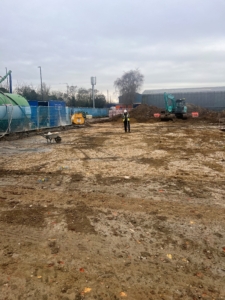CASE STUDY
Date: Dec 2023
Client: Faircloth Construction Ltd
Project: Industrial Warehouse Project – Enfield
Deep Soil Mixing Ltd has successfully completed a 5-week project for their client Faircloth Construction Ltd, to improve the loadbearing capacity of the ground on a brownfield site in Enfield, North London. Following the ground stabilisation using soil mixing client Faircloth Construction have built a large industrial warehouse.
Deep Soil Mixing Ltd worked closely with Faircloth Construction to deliver the necessary ground improvement solutions and eliminate the potential for excess settlement that enabled work to begin on building the new warehouse on the site.
The soil mixing resulted in an increased soil bearing pressure and greater capacity to load bear. Faircloth were then able to construct the steel frame with composite cladding to provide warehouse space and an ancillary office.
The Solution
The industrial site where the new warehouse was to be built lies next to a railway line – working next to a railway line meant there could be no vibration exerted on the ground.
This is why soil mixing solutions were used on this project as the technology delivers the required levels of soil stabilisation and strength without producing vibration.
As a result of the mass soil mixing of the ground on-site, there was a reduced frequency transfer from the railway line to the industrial site, enhancing the already improved soil stability and load bearing strength of the site soil.
Mass soil mixing also meant the existing soil did not need to be removed from site and replaced, saving time and money, and keeping the carbon footprint of the project to an absolute minimum.
Instead, the existing site soil was mixed with the previously trialled and tested binder to create the optimum soil consistency needed to meet the project design requirements.
Less vehicle movements also improved health and safety on site.
The Project
The carefully selected binders were mixed at the correct quantities and soil depth to achieve maximum improvement of the soil bearing capacity whilst removing any potential for excess settlement at the site.
Quality Assurance
Deep Soil Mixing Ltd provides quality assurance with each and every project undertaken – as the recently completed mass mixing of the site ground on Suez Road in Enfield demonstrates.
Quality is guaranteed as a result of the technology, method and ongoing monitoring that takes place as standard.
All details relevant to the soil mixing undertaken is logged and regularly monitored using our plant on board computers and our field- and laboratory-based test results. Important information such as mixing tool type, binder specifics, mixing depth, mixing pressure, flow rate and mixing head rotation, are closely and regularly checked to ensure the right binder consistency is used and that all the requirements of the build design are met.
Throughout the project, checks are made on the stability and strength of the mixed soils at the relevant soil sections and depths – samples are then tested at the laboratory to make sure the required soil consistency has been achieved site-wide.
What are the benefits of using soil mixing?
Environmentally Friendly & Economical: Natural resources are spared as existing soil is used as aggregates. Many forms of contaminated ground can also be mixed which reduces transportation of raw materials to landfill. The use of soil mixing can also reduce construction programme and reduces carbon footprint with less vehicular movements.
Flexible: Effective on different soils, including soft soils, flood plains, contaminated land, peat, silts and alluvium etc. Flexibility also in design and application as well as installation of the soil mix not being affected by the weather. The final cured product can also be shaped, benched or battered to suit.
Reduces Construction Programme
Improved health and safety due to less vehicle movements on site
Reduced Vibration: Soil Mixing induces very low vibrations, which reduces the potential impact to nearby utilities.
Increases bearing pressure, controls settlement and reduces permeability.
Wide range of soils can be treated compared to other solutions
No need to bring costly and bulky materials on site
Reduces vehicle movement and therefore improves site safety








